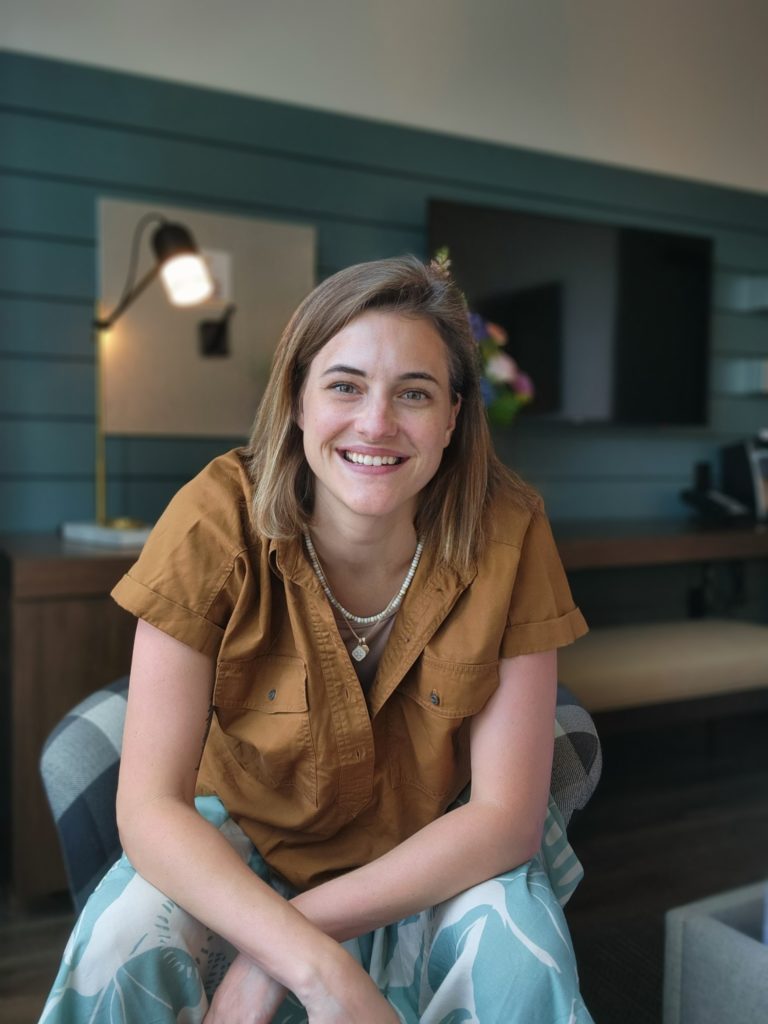When Eleos Health Customer Success Manager Emma Cope-Flanagan, LICSW, began working as a social worker at Boston Children’s Hospital, Covid-19 was in full swing.
“I was in a whole PPE from head to toe. I had the mask, the N-95, the gloves, the full get-up. Sometimes I even had the whole hood over it. One day, a 17-year-old came in. She was shot in the leg, and I was in full PPE next to her because her parents weren’t there yet.”
While Emma was not a new clinician, the trauma of working with children in a medical center eventually started to wear on her. She decided to change gears and began working with adults at Tufts Medical Center.
“That is where I was supposed to have a caseload of, like, five clients. And it was really what was considered bridge therapy. If someone came into the clinic and they were in crisis and they needed a therapist, but they couldn’t find a therapist in the community. I would “bridge” them til they found their therapist. But what was supposed to be five clients quickly grew to 20. And then grew from 20 to being full-time, ongoing, eight plus months at a time.”
Emma’s experience isn’t unique- or even surprising. According to the American Psychological Association, 60% of practitioners no longer have openings for new patients and nearly half (46%) say they cannot meet demand.
“No one could find a therapist in the state of Massachusetts during that time,” Emma shared. “It took between three months to a year to find a therapist.”
In addition to managing a full caseload of high-need therapy clients at Tufts, Emma was also responsible for responding to patient emergencies and routine social work referrals.
“We could have anywhere between 5 to 21 referrals every day,” she said. “Then you started going through and addressing some of the referrals. Sometimes those referrals look like getting someone connected to a therapist, housing resources, or to food resources. And then I would, ideally, have anywhere between three to four therapy sessions a day. And then I’d be available for crisis work.”
Emma says that this level of stress- a result of increased demand for mental health services coupled with a reduction in community resources- is indicative of a systematic problem. It’s also leading qualified mental health clinicians to leave the field.
“We’re not retaining clinicians, and we’re definitely not retaining the clinicians who are well-versed, well-experienced, and on top of things.”
Turnover in community mental health agencies has been a problem since long before the pandemic. One study estimated the industry turnover rate at around 30%- with some organizations seeing up to 100% turnover every year.
“I see burnout, and I see people leaving the field. Unfortunately, I am one of them,” Emma admitted. “I was looking for an opportunity to combat the systemic issues for more of a macro standpoint than a micro standpoint. So how can I come in and essentially disrupt the system? What can I do to start to change the conversation?”
Emma’s desire to make a bigger impact led her to Eleos, where she now works to ease the burden on clinicians.
“Every time I meet with my clinicians that I work with, I tell them, ‘at the end of the day, you’re who I care about. Your opinion is what matters to me. So if you say to me, “this doesn’t work with my workflow,” I’m going back to my product team and say, “this doesn’t work with their workflow. We need to change it.”
“That’s what brought me to Eleos- my genuine passion to further our communities in the field of technology, and then also raising our voices for what matters. Being able to use that data and say, “Hey, look at all the work we do. Now pay us better, value us more, and respect us more. Allow us to be a part of the conversations.”
The feedback Emma has gotten from Eleos customers is evidence that her efforts are having an impact- both in terms of reducing the administrative load and increasing clinician effectiveness.
“One of the clinicians told me that Eleos helped increase her clinical skills by using the session analytics and the suggestions that are provided. Not only to better her progress, but she feels like she’s learning “the why” behind it,” Emma shared. “With another customer, we averaged how long it took their clinicians to write progress notes, and it was anywhere between 15 to 20 minutes. And now they have it down to about five minutes.”
And while Emma is creating systematic change at Eleos, she hasn’t hung up her clinician badge completely- although the unreasonable pressures of clinical still trouble her.
“I’m still per diem at Tufts. I still practice, and I’m still a huge advocate for it. But it wasn’t unusual that I’d have a shift where I had experienced a death, or I had a homicidal, pregnant woman. The expectation was just to keep going. There was no, “hey, what you just experienced was a lot. Let’s talk about it. Let’s ensure that you have the resources to set you up for success. Let’s minimize your calendar for the rest of the week.”
“The number of acute clients has become tenfold. So clinicians are holding so much more- both what’s happening with their clients, and their own secondary trauma.”
Leaders of mental health organizations are familiar with the struggles clinicians like Emma are experiencing. Eleos is committed to partnering with these organizations to lighten the load on clinicians all over the world- get in touch with our team today to find out how Eleos can help.
